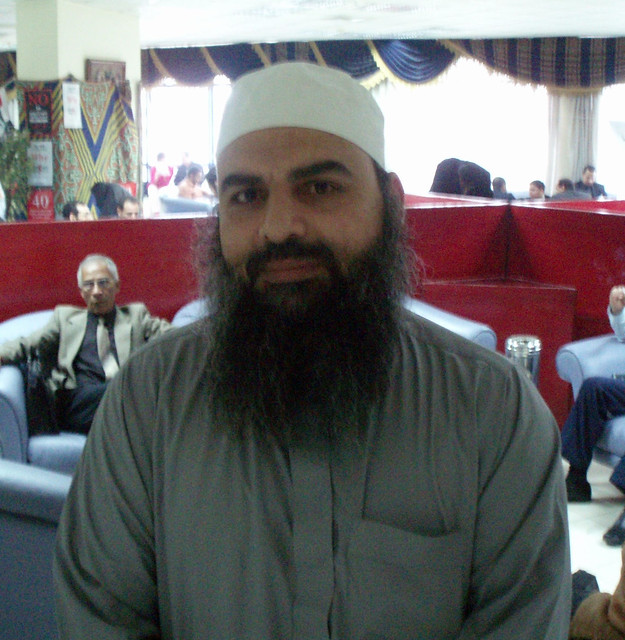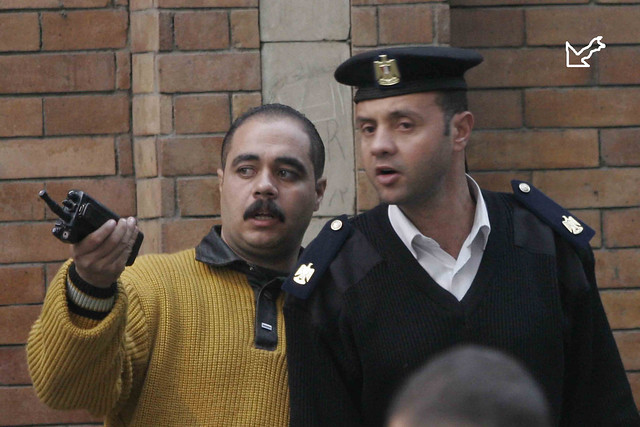State Security cracked down today on Mahalla labor activists, banning them from traveling to Cairo to lobby their General Federation of Trade Unions to impeach their corrupt local union branch as well as a set of other demands related to work conditions.
More than 100 workers assembled in the morning near the Mahalla Train Station, where two buses had been hired to transport them to Cairo. One bus was to carry a delegation to the Ministry of Social Insurance, to express solidarity with the Center for Trade Union and Workers’ Services, and the other was to take the workers to the HQ of the General Federation of Trade Unions to stage a sit-in if their demands were not met.
The workers were shocked to find the buses’ owner showing up and instructing his drivers to leave immediately, citing threats from State Security agents of revoking the buses’ licenses and the closure of his business. The agents also were heavily present around the factory compound, and the city entrances/exits. When a group of workers moved to the train station, in an attempt to catch a ride to Cairo, they were met by State Security agents. They besieged the activists, including Muhammad el-Attar, in a circle, and refused to let them move for roughly an hour.
While a handful of workers managed to escape from the police, and trickled to Cairo in microbuses, back in the company, several hundred women workers in the garments-making Factory Section 4 went on strike for 45 mins, protesting the shortage in raw materials supply, which leads to the decrease in their bonuses, which are based on units produced.
Mahalla worker and blogger Kareem el-Beheiri has been following up on the situation there all throughout the day. You can read his postings here.
“There are murmurs in the factory among workers about a second attempt to go to Cairo and launch a sit-in at the General Federation,” he wrote. “There are also murmurs of possibly a new strike. Tension is running high.”
Those workers who managed to make it to Cairo, joined around 30 rights and labor activists who assembled inside the Ministry of Social Insurance compound around 1am to protest the closure of the Center for Trade Union and Workers’ Services offices in Naga’a Hammadi and Mahalla.
There was a group of Central Security Forces soldiers deployed outside the ministry building, in addition to usual faces from State Security’s Counter-Communism bureau and Qasr el-Nil Police Station. But they did not ban the activists’ silent protest. Still, it was amusing to watch plainclothes thugs deployed by the police to guard the ministry’s building.
The activists demanded to meet the Minister, and after negotiations with State Security agents, a delegation (including Kamal Abbas the CTUWS director and Karama Party MP Hamdeen Sabbahi) met with the minister’s assistant in charge of the NGOs portfolio, who basically told them, the decision to close down the CTUWS offices was not “the ministry’s call.” So who’s call was it, asked the activists. The woman refused to reply. “It’s of course a decision by State Security,” commented Kamal Abbas. Another meeting is scheduled on Monday between CTUWS officials and the Ministry.
Here’s a short video clip of today’s protest, shot by the anti-corruption watchdog Shayfeencom
The Center for Socialist Studies issued a statement denouncing the police assaults on labor activists and strikers. Human Rights Watch also blasted Mubarak’s regime’s crackdown on the CTUWS offices:
The Egyptian government should reverse its order to close two offices of the Center for Trade Union and Workers’ Services (CTUWS) and should cease harassing the organization, Human Rights Watch said today.
The organization offers legal aid to Egyptian factory workers, educates them as to their rights, and reports on labor-rights issues in the country. The Ministry of Social Solidarity has blamed the CTUWS for inciting widespread labor unrest around the country. Egyptian officials have ordered two branches of the CTUWS to close within the last two weeks.
“Closing the offices of a labor rights group won’t end labor unrest,” said Sarah Leah Whitson, Middle East director at Human Rights Watch. “The government should be upholding legal commitments to Egyptian workers instead of seeking a scapegoat.”
On April 11, approximately 100 police officers arrived at the CTUWS office in the Nile Delta town of al-Mahalla al-Kubra to deliver an administrative decision ordering its closure. This came just over a week after General al-Sharbini Hashish, head of the Local Council in the southern industrial town of Naga` Hammidi, issued an administrative decision on March 29 ordering the closure of the CTUWS branch there on the grounds that it violated Egypt’s law on associations, though the order did not specify how.
Government action against the Naga` Hammidi branch of the CTUWS began in mid-March, when officials from the Ministry of Manpower and Immigration called the center’s representatives in for questioning, saying they had orders to investigate the legality of the center’s operations. Days before Gen. Hashish issued the order to close the center, the local representative of the Ministry of Social Solidarity requested CTUWS representatives to come to the local office of the Interior Ministry’s office of State Security Investigations. They declined the invitation.
The government’s moves against the CTUWS come amid continuing labor unrest throughout Egypt. According to a March 2 story in the independent newspaper Al-Masri al-Youm, there were 222 sit-ins, strikes, and workers’ demonstrations in 2006. The largest was a public-sector textile workers’ strike at a factory in al-Mahalla al-Kubra in December 2006.
That strike came after the al-Mahalla office of the CTUWS helped inform textile workers of Prime Minister Ahmad Nazif’s March 3, 2006, decree that all public-sector textile workers’ year-end bonuses should henceforth be equal to two months’ salary, up as much as 500 percent from a flat, pre-tax bonus of 100 Egyptian pounds (US$18). Factory managers initially denied that the decree had been issued, saying that it was a nonbinding political promise. When representatives of the government-affiliated General Textile Worker’s Union failed to make good on their election promises to extract the increased bonus from the government, more than 20,000 workers at the Mahalla al-Kubra textile factory went on strike until the government offered a 45-day bonus.
Since then, thousands of workers have resigned from the General Textile Workers’ Union, saying the elections were fixed in favor of the government’s candidates, and more than 30,000 textile workers at other factories in the Delta have staged protests. Thousands of cement factory and railway workers, some of whom told reporters they were inspired by the Mahalla workers’ success, have staged protests ranging from slowdowns to strikes. Officials from the Ministry of Social Solidarity have blamed the CTUWS for the unrest on television talk shows and on the floor of the Shura Council, the upper house of Parliament.
You can find the HRW statement in Arabic here.
Keep your eyes on Mahalla.





![Muhammad el-Sharqawi hours before he was kidnapped by State Security on May 25, 2006. Photo courtesy of an activist friend]](https://arabawy.org/wp-content/uploads//2021/01/d1-213x315.jpg)